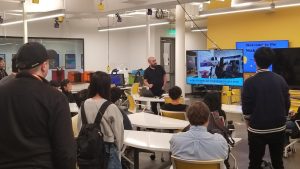
On this edition of Defining Experts, Assistant Professor of Games and Interactive Media, Sercan Sengun, discusses his research interests, notable achievements, future projects, and advice for aspiring gamers and creators.
What are your research interests?
“My research goals are to produce breakthrough results, publications, and academic tools in three main areas: (1) design principles for better virtual identity systems in digital platforms; (2) digital narratives on cultural and personal representations; and (3) cross-cultural challenges in media production and use.
For the first area, I aim to explore how virtual identity systems embody and reinforce cultural norms, paragons, stereotypes, and prejudices. I find this to be a high-stakes issue in the future of digital communications as it affects the access, performance, and engagement of people from different cultures within digital media platforms. Consequently, I want to formulate design strategies to build information and communication systems that better serve underserved and underrepresented communities.
For the second area, as well as investigating new methods of digital and interactive storytelling, I also perform critical analysis of algorithms and data structures of representations in virtual environments and storytelling.
My final research focus is to examine the relationships between local audiences and creative industries (specifically the video game industry and mobile apps). I am especially interested in culturally specific ways of development (e.g. content creation, affordances design, etc.), cultures representing other cultures, and the reactions of various audiences to culturally specific content (such as content inspired by their own cultures vs. others).
I see many overlapping themes in these three research interests, especially around the issues of cultural identities, cultural representations, and culturally specific design and production practices inside digital and virtual environments. As a result, I see all these research endeavors as supporting and enriching each other in the future.”
What made you interested in games and interactive media?
“I have been an active gamer from a young age, and I was always interested in how games represent communities and cultures. Growing up in Istanbul, Turkey, at a time when the Internet was not prevalent and TV broadcasts were limited, games were one of the few places I was exposed to stories and characters from different cultures both in real life and in media. In later years, I was hooked on the potential of games to engage and empower people in unique ways. As both a researcher and a game designer, I am fascinated by how video games can serve as powerful tools for storytelling, expression, and social interaction. Games can transcend traditional boundaries and create immersive experiences that can foster empathy, creativity, and critical thinking skills. Additionally, I’m intrigued by the cultural significance of gaming communities and how they shape and influence broader societal trends. Overall, my passion for games and interactive media lies in their capacity to inspire meaningful connections and explore complex phenomena in innovative ways.”
What are some notable achievements that you would like to share?
“My website (https://sercansengun.com/) and my X account (https://twitter.com/sercan314159) are the best sources to follow my recent professional work and achievements.
Recently, I collaborated with an amazing team to release multiple VR works including “Missing.” These works add to my list of previously published digital and analog games that are produced for purposes such as activism, art, learning, and social impact.
In the last few years, I was very fortunate to serve as a research affiliate for the MIT Center for Advanced Virtuality and MIT IDSS (MIT Institute for Data, Systems, and Society) within the Antiracism, Games, and Immersive Media ICSR Project Team, allowing me to collaborate with leading scholars and practitioners in the field.
Overall, I contributed to the advancement of video game studies, gamer communities, cultural informatics, virtual identities, and interactive narratives through my research, publications, and presentations at academic conferences and events.”
What upcoming projects/plans do you have for the future?
“In the future, I am excited to continue exploring and contributing to the field of games and interactive media through a variety of projects and initiatives. I am always expanding my research agenda to delve deeper into emerging trends and phenomena within the gaming industry, such as the intersection of virtual reality and social interaction, the impact of esports on global culture, and the potential of gaming for social change and advocacy.
Being a part of the UCF’s world-recognized Games and Interactive Media program allows me to collaborate with colleagues and students on innovative research projects that push the boundaries of what is possible in games and interactive media, including exploring new technologies, methodologies, and design approaches. I am following up on some opportunities to engage with industry partners and practitioners to apply research findings and insights to real-world game development projects, with a focus on creating meaningful and impactful gaming experiences for diverse audiences.
Overall, my goal for the future is to continue making meaningful contributions to the field of games and interactive media, while also inspiring others to explore the creative and scholarly potential of this exciting and rapidly evolving domain.”
What advice do you have for aspiring game designers/creators out there?
“For aspiring game designers and creators, I have several pieces of advice:
First, they need to start by gaining a solid understanding of game design principles, mechanics, and theory by studying relevant literature, taking courses, and playing a wide variety of games across different genres and platforms. They should never forget that the best way to improve as a game designer is to create games. They can start small with simple projects and gradually work their way up to more complex ones. They should not be afraid to experiment, iterate, share their work with others, and receive constructive criticism. They need the feedback to identify areas for improvement and iterate on their designs accordingly. Failure is a natural part of the creative process, and each iteration brings you one step closer to success.
Second, game design is a multidisciplinary field that requires a range of skills, including programming, art, storytelling, sound design, and project management. Aspiring designers must take the time to develop their skills in these areas and consider collaborating with others who have complementary expertise. Keeping up with the latest trends, technologies, and developments in the gaming industry by reading industry news, following influential designers and developers on social media, and attending conferences and events is also a good way to know the different skills that are in demand. Games and Interactive Media are industries where the learning never stops.
Finally, it is important to build relationships with other game designers, developers, and industry professionals by attending meetups, joining online forums and communities, and participating in game jams and collaborative projects. Networking can open doors to new opportunities and help you grow as a designer. Also, picking and immersing yourself in gamer groups and genres can be a way to learn about what players want in games. Game design is a competitive and challenging field. By building your audience and a group of inspiring supporters, you can stay focused on your goals and keep pushing forward.
Overall, my advice for aspiring game designers and creators is to embrace creativity, curiosity, and collaboration, and to never stop striving to create games that are meaningful, impactful, and enjoyable for players around the world.”

Dr. Sengun presenting his VR work to the participants of IEEE VR 2024 conference.
By Majdulina Hamed.
Published to Nicholson News on April 4th, 2024.
If you have any news, accomplishments or highlights about your work or life, please be sure to share them with us, by emailing us at NicholsonNews@ucf.edu.